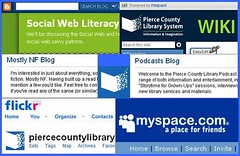Hi. I’m Steve Campion, System Trainer for Pierce County Library.
It’s honor to be asked by Michael to write a guest posting in his blog because hearing him speak last October motivated me to kick-start an entire social web cirriculum and a flurry of activity here. Susan McBride and I started teaching a popular four hour social web literacy class to staff within two months of Michael’s talk. With the social networking buzz going around, our library system created several public blogs, podcasts, a MySpace page, a very active Flickr page, and a wiki.
Not everyone is excited about the possibilities, however. As with any organization, there are early adopters as well as skeptics. First the adopters.
Susan and I teach three social web classes each month. Every ten-student class has filled within two days of the announcement, proving that the enthusiasm is there. Word has gotten out that the course is a lot to absorb yet fun. We have seen the faces of many students light up once they understand social websites like Flickr and Dogster. We have dozens of LibraryThingers swapping account names. One staff member was a novice blogger but used one to full potential when she and her husband traveled to China soon after the class. My favorite compliment came from a woman who passionately dislikes computers: “I was surprised that I didn’t HATE the class.” LOL. We haven’t come close to doing everything I’d like to do with social networking but staff know the terms now and we’re talking about new tools and creative interactive possibilities.
We have also heard from people who “don’t get into stuff like that.” Some staff take the class voluntarily (it will be required this fall, but has been optional so far) only to walk away unconvinced. One woman told me that we have a website for talking to the patrons, but patrons have no interest in talking to us. We try to anticipate that reaction by demonstrating in class how many people are using MySpace, Facebook, YouTube, SecondLife, and the countless other social and gaming sites. This is a societal trend. People are coming to expect interaction online. The younger generations will insist on it soon. Libraries should be prepared. In fact, we should be ahead of the curve if we hope to stay relevant.
The toughest sells are the staff who show no interest in coming to the class. Some people aren’t comfortable with change; others simply don’t think social networking is a direction the library should pursue. That’s a reasonable opinion, but we can’t demonstrate what’s possible if they aren’t willing to attend. I’m confident libraries MUST go in an interactive direction. I’m counting on the success of the class and the enthusiasm of others to win them over. Patience, I remind myself. Patience and determination.
One other critique involved how many blog postings we would need before we could actively advertise to our public. I thought that was a curious perspective. Web 2.0 things are not like library collections. You don’t have to gather up a collection and at some critical mass make the whole available. Web 2.0 is much more in the here and now. Their products are like newspaper columns. People will read today’s column. In some cases they will read yesterday’s. In only the rarest cases will they go back a read columns from a year ago. If motivated, a reader will dash off a letter to the editor – but again it will be for today’s column.
Blogs are similar. There are benefits to archiving blogs and making those archives available, but the real interest and interaction is always going to take place in the most recent one or two postings. If these networking tools were a materials collection – like a new audio format – I can see building a collection quietly before you offer it because you need enough material to share. But Web 2.0 has no such limitations and its real value is its contemporary nature and interactive component. You must certainly plan, but you must also follow through and make it happen. It needn’t take long: weeks, not months or years.
Many opportunities for customer interaction await us and one of the wonders of the social web is that its tools can reinforce what we already do. A podcast can advertise a program. The program can refer to a blog. An online photo album can showcase the last program and advertise the next. The presentation or forum might excite people you never reached before. Everything can point to the catalog. And customers can comment at every step of the way.
I hope our organization — and other libraries, too — don’t blow this chance. I’d like to see us move on many projects, fueled by the fresh enthusiasm of the many new social web participants on staff. But no large organization can shift gears suddenly. Some patience must be exercised and some skeptics must be won over. But I’d hate to hesitate for too long. There’s so much we could do right now.

